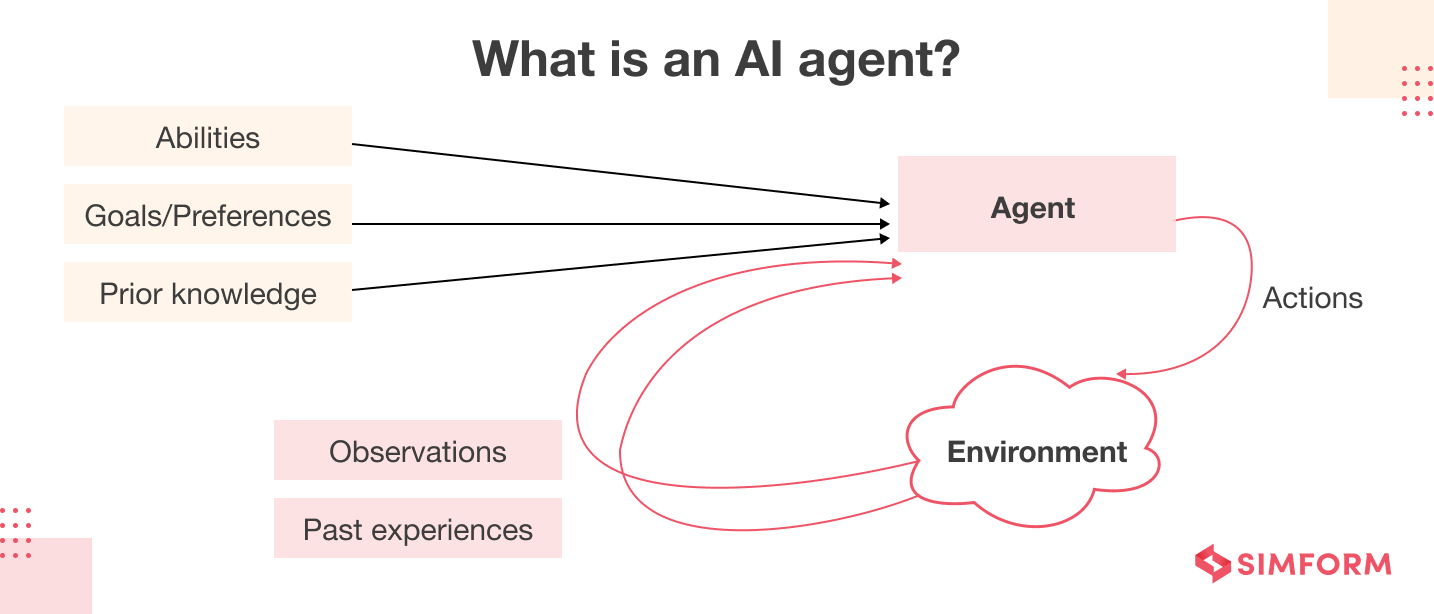
Harnessing the Power of Intelligent Agents in AI
Estimated reading time: 8 minutes
Key Takeaways
- Autonomy and Adaptability: Intelligent agents operate independently and adjust to their environments.
- Diverse Applications: From virtual assistants to autonomous vehicles, intelligent agents are revolutionizing industries.
- Complex Decision-Making: These agents employ advanced perception, reasoning, and action cycles to optimize performance.
- Integration with AI: Leveraging machine learning and natural language processing, intelligent agents are at the forefront of AI evolution.
- Future Impact: The continuous advancement of intelligent agents is set to reshape technological and industrial landscapes.
Table of contents
Introduction to Intelligent Agents in AI
What is an Intelligent Agent?
An intelligent agent in AI represents an autonomous entity, whether crafted from software or hardware, that perceives its environment and processes information to perform actions aimed at achieving specific objectives. This fundamental concept serves as the cornerstone for systems that independently decide, problem-solve, and interact with their surroundings. For more details, please learn more about intelligent agents and also check out further definitions on intelligent agents.
Overview of Intelligent Agents in AI
Intelligent agents play a pivotal role in artificial intelligence by powering virtual assistants, autonomous vehicles, sophisticated recommendation systems, and robotics. Their vast applications underscore their significance in today’s technological landscape. To dive deeper into their applications, read more on AI agents.
The Increasing Importance of Intelligent Agents
These agents are integral in transforming industries by autonomously analyzing situations and executing informed decisions. Their advancement mirrors the evolution of multi-agent systems, which can be further explored at Multi Agent Systems: A Comprehensive Guide to Scaling AI Agents for Business.
Understanding Intelligent Agents
Categorizing Intelligent Agents
Intelligent agents can be classified based on their mechanisms and the complexity of their actions. Here’s a brief overview:
- Simple Reflex Agents: Operate on direct condition-action rules, reacting immediately to inputs.
- Model-Based Agents: Maintain internal states or models of the world to handle dynamic environments.
- Goal-Based Agents: Work towards defined objectives by evaluating alternatives based on anticipated future states.
- Utility-Based Agents: Aim to maximize performance using a utility function to assess outcomes.
Each type is designed to fit various applications, embodying different capabilities. For additional insights, explore different types of intelligent agents. Further context on multi-agent systems is available at Multi Agent Systems: A Comprehensive Guide to Scaling AI Agents for Business.
Core Characteristics and Components
The sophistication of an intelligent agent stems from attributes such as:
- Autonomy: The ability to operate independently without human intervention.
- Adaptability: Adjusting actions in response to new data or shifts in the environment.
- Proactivity and Reactivity: Initiating goal-driven actions while simultaneously responding to immediate changes.
Integral components include sensors for data collection, actuators for interaction, and decision-making engines that process inputs. These combined elements form the operational backbone of each intelligent agent.
How Intelligent Agents Function in AI
The Architectural Framework
The mechanism of an intelligent agent is driven by a three-step cycle:
- Perception: Collecting inputs from the environment using sensors.
- Reasoning: Analyzing data to form decisions, often based on learned patterns or rules.
- Action: Implementing decisions through actuators to affect the environment.
This continuous cycle enables the agent to learn, adapt, and optimize its response accuracy over time. For an expanded look at AI agent architecture, understand AI agent architecture.
The Roles of Sensors and Actuators
Sensors gather vital data from the environment, while actuators convert decisions into tangible actions – both working in unison to create a responsive system.
Decision-Making in Intelligent Agents
At the heart of every intelligent agent is a decision-making process that cycles through perception, reasoning, and action. This iterative method is crucial for effective adaptation and continuous improvement. For more details, explore Decision-Making in AI Agents.
AI and Intelligent Agents: The Symbiotic Connection
Integrating AI with Intelligent Agents
Artificial intelligence enhances intelligent agents by providing advanced algorithms and learning techniques. Key capabilities include:
- Machine Learning: Using data-driven approaches to improve performance over time.
- Natural Language Processing: Enabling better communication with humans.
- Pattern Recognition: Allowing agents to identify and adapt to environmental changes.
These advanced techniques empower agents to execute complex tasks autonomously. For a revolutionary perspective on AI research tools, refer to OpenAI Deep Research: Revolutionary AI Tool Transforms Professional Research Capabilities and explore AI techniques in intelligent agents.
Future Directions and Potential of Intelligent Agents
Emerging Trends in Intelligent Agents
The next phase of development involves deeper learning algorithms and the rise of multi-agent systems where multiple agents collaborate to address complex tasks. To learn more, visit Multi Agent Systems: A Comprehensive Guide to Scaling AI Agents for Business.
Implications for Industries and Societies
As these agents evolve, they promise to automate complex tasks, enhance efficiency, and revolutionize industries. Ethical considerations regarding autonomy, transparency, and privacy remain paramount as the technology matures.
Conclusion: The Role of Intelligent Agents in Shaping AI
Intelligent agents have emerged as a significant breakthrough in artificial intelligence. By autonomously perceiving, analyzing, and acting on data, they not only optimize digital processes but also pave the way for transformative innovations across multiple sectors. For those eager to explore further, a wealth of resources is available – including this detailed overview on intelligent agents and AI and insights from OpenAI Deep Research.
Take the Next Step in AI Exploration
Engage with scholarly articles, advanced AI courses, and comprehensive technology reviews to deepen your understanding of how intelligent agents are reshaping our future.
Frequently Asked Questions
- What exactly is an intelligent agent?An intelligent agent is an autonomous system capable of perceiving its environment, processing data, and taking actions to achieve specific goals. It integrates sensors, actuators, and decision-making engines to function independently.
- How do intelligent agents learn and adapt?They use techniques such as machine learning and pattern recognition to learn from data, allowing them to continuously improve performance and adjust to changing environments.
- In which industries are intelligent agents most impactful?From virtual assistance and autonomous vehicles to robotics and complex industrial automation, intelligent agents have applications across a broad spectrum of industries.
- What are the ethical considerations with intelligent agents?As with any autonomous system, issues of transparency, privacy, and accountability are paramount. It is essential to ensure these systems are designed with robust ethical standards.
- Where can I learn more about intelligent agents?Comprehensive information can be found in resources like Wikipedia or specialized articles such as those on Multi Agent Systems for Business.

Leave a Reply